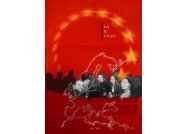turkish-greek civic dialogue - AEGEE Europe
turkish-greek civic dialogue - AEGEE Europe
turkish-greek civic dialogue - AEGEE Europe
You also want an ePaper? Increase the reach of your titles
YUMPU automatically turns print PDFs into web optimized ePapers that Google loves.
54<br />
want to be a citizen of the country; the minority identity is given to you by<br />
force. This is segregation as it was the case with Germans and Jews. None<br />
of the Jews wanted to be a German; they wanted to be Jews. Therefore,<br />
minorities should have the right to self-identify themselves or just to be a<br />
member of the society without getting this identity. It’s very complex issue and<br />
leads to racism. If we see a minority member in our country, we don’t ask him<br />
if he wants to be identified like that.<br />
I have been a member of minority group in Turkey, I tried to be member of this<br />
society but I couldn’t manage. The society didn’t accept me. I have been a<br />
Turkish citizen; I’ve been member of many professional organisations in Turkey.<br />
I worked as civil servant in Turkey. I served for the Turkish army. I was a<br />
member of Turkish basketball team. I represented Turkey abroad. I published<br />
books in Turkey, but still I’m not considered as a normal Turkish citizen. I’m<br />
abnormal. Why? I don’t know why. Probably because I had an Orthodox Christian<br />
tradition. Nobody asked me my religion. Nobody asked me if I am really a<br />
Christian Orthodox. They put it on my identity card when I was born. I wanted<br />
to change my identity card. When my son was born, they wrote on his identity<br />
card “dini Hristiyan mezhebi Rum” (religion: Christian, denomination: Rum),<br />
there is no such a denomination (mezhep) and I went to court for that. This is a<br />
clear segregation and racism and indicates how uncivilised we are as a society<br />
and how far we still have to go.<br />
SERDAR DEĞIRMENCIOĞLU<br />
BILGI UNIVERSITY, PSYCHOLOGY DEPARTMENT<br />
The issue of trust is a big issue in Turkey and the question “Who do you trust?”<br />
has an internal reflection. When you ask this question in public polls, we see<br />
that people actually are not trusting any more to anyone other than the army<br />
and the state. This is something that actually fits world where we are living<br />
right now. At the moment, a big major power, the US government and Bush,<br />
are using scared tactics to push the public opinion in behind stage for war. The<br />
first time I experienced scared tactics was in Greece 1972, when I was a kid<br />
and Greece was under military rule. There was a guy with a rifle and there was<br />
a curfew. I didn’t know what a curfew was. But there were apparently several<br />
curfews and I realized that people in Greece at that time were scared. They<br />
were scared to talk, they were scared to act and the minority in particular was<br />
very scared.<br />
This is not just in Greece, later on in Turkey there was severe terrorism and<br />
people were very afraid. When you have people intimidated and scared, then<br />
people act like a sheep, they become a sheep and you can shape them. When<br />
you don’t have trust in “the Other”, even though he/she is your fellow partner<br />
we don’t start acting. If we analyse how people acting in their daily lives, we<br />
see a lack of public engagement. As far as I could observe, there is essentially<br />
not a public engagement in Greece, people do not that strongly follow their<br />
lives and telling their politicians that they are actually playing with politics.<br />
If we were to build trust and confidence within the country, then we need to<br />
speak out that “this is my life and I am taking all the control over then”. If<br />
you were to trust to military in Turkey, then it is difficult to build trust on both<br />
sides. No one should be trusting to any military. Military is the greatest danger<br />
in the world. To build trust and confidence, citizens of the country should<br />
be able to think, should claim their public space, and should be able to deal<br />
with foreign affairs. In many countries foreign affairs is the sole job of the<br />
government. Fortunately, this is changing in <strong>Europe</strong> since borders are becoming<br />
essentially more transparent.<br />
Rebuilding Communication Association des Etats Généraux des Etudiants de L’<strong>Europe</strong>







